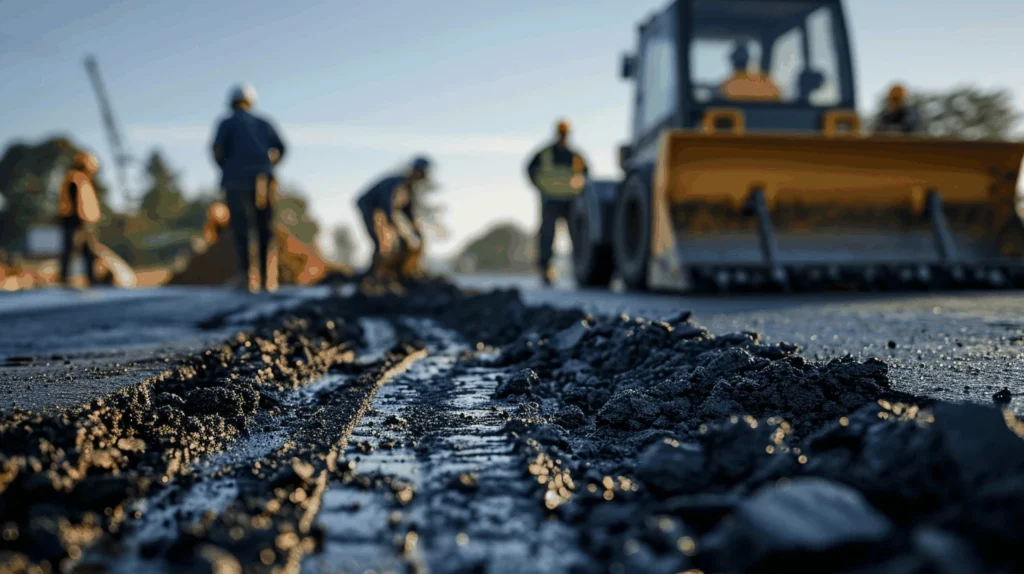Enhancing Surface Bonding: The Chemistry Behind Asphalt Cold Seal
by siteadmin

Chemical reactions are the hidden forces that drive numerous processes in our daily lives, even in seemingly mundane activities like maintaining roads. One such process, often overlooked but crucial, is asphalt cold sealing. In this blog post, we’ll delve into the chemistry behind asphalt cold seal and how it enhances surface bonding, ensuring durable and resilient road surfaces.
Understanding Asphalt Cold Seal
Asphalt cold sealing is a vital step in road maintenance and construction, particularly in regions with fluctuating temperatures. It involves the application of a specialized emulsion to asphalt surfaces at ambient temperatures, unlike traditional hot mix asphalt which requires high temperatures for application.
The primary component of asphalt cold seal is an emulsifying agent, typically a cationic surfactant. This agent facilitates the dispersion of asphalt particles in water, forming a stable emulsion that can be applied directly onto the road surface.
Chemical Reactions at Work
The effectiveness of asphalt cold seal lies in the chemical reactions that occur upon application. When the emulsion is sprayed onto the asphalt surface, several key reactions take place:
- Water Evaporation: As the emulsion is applied, water quickly evaporates, leaving behind a thin film of asphalt particles on the road surface.
- Adhesion: The cationic surfactant in the emulsion promotes adhesion between the asphalt particles and the existing road surface. This adhesion is crucial for ensuring proper bonding and cohesion within the asphalt layer.
- Breaking and Coalescence: Once applied, the emulsion undergoes a process called breaking and coalescence. This involves the separation of water from the asphalt particles, followed by the fusion of adjacent asphalt particles to form a continuous film. This film effectively seals the surface, preventing water penetration and enhancing durability.
- Curing: Over time, the asphalt cold seal undergoes further curing through oxidation and polymerization reactions. These reactions strengthen the bonds between asphalt particles, increasing the overall resilience of the road surface.
Benefits of Asphalt Cold Seal
The chemistry behind asphalt cold seal offers several advantages:
- Improved Durability: By enhancing surface bonding, asphalt cold seal helps prevent cracks and deterioration, prolonging the lifespan of roads.
- Cost-Effectiveness: Cold sealing is a cost-effective alternative to traditional hot mix asphalt, requiring fewer resources and less energy for application.
- Versatility: Asphalt cold seal can be applied to various asphalt surfaces, including pavements, parking lots, and driveways, making it a versatile solution for road maintenance.
- Environmental Friendliness: Cold sealing eliminates the need for high-temperature heating, reducing energy consumption and greenhouse gas emissions associated with asphalt production and application.
Chemical reactions play a crucial role in the effectiveness of asphalt cold seal, enhancing surface bonding and ensuring the longevity of road surfaces. By understanding the chemistry behind this process, engineers and road maintenance professionals can make informed decisions to optimize road performance and sustainability. As we continue to innovate in the field of pavement maintenance, the chemistry of asphalt cold seal remains a fundamental aspect of ensuring safe and reliable transportation infrastructure.
Interested in delving deeper into asphalt? Here’s another article tailored to your curiosity!
Preventative Asphalt Maintenance
Chemical reactions are the hidden forces that drive numerous processes in our daily lives, even in seemingly mundane activities like maintaining roads. One such process, often overlooked but crucial, is asphalt cold sealing. In this blog post, we’ll delve into the chemistry behind asphalt cold seal and how it enhances surface bonding, ensuring durable and…
Recent Posts
- Asphalt Sealing Rochester NY – A Women-Owned Business With a Mobile App
- Asphalt Sealing Rochester NY – A Women-Owned Business With a Mobile App
- Maximizing the Longevity of Your Driveway: Effective Maintenance Strategies with Protective Sealants
- Full-Depth Asphalt Repair: Addressing Structural Issues Beneath the Surface
- Choosing the Right Driveway Repair Materials: Assessing Durability and Longevity
